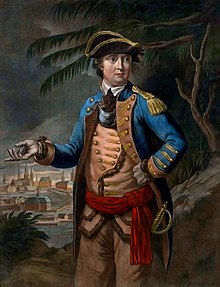
Back بينيديكت أرنولد Arabic Benedikt Arnold Azerbaijani Бенедикт Арнолд Bulgarian Benedict Arnold Catalan Benedict Arnold Czech Benedict Arnold Danish Benedict Arnold German Benedict Arnold Spanish Benedict Arnold Basque بندیکت آرنولد Persian
Benedict Arnold | |
|---|---|
 Portrait of Arnold in 1776 | |
| Born | January 14, 1741 Norwich, Connecticut Colony, British America |
| Died | June 14, 1801 (aged 60) London, England |
| Buried | 51°28′36″N 0°10′32″W / 51.47667°N 0.17556°W |
| Allegiance |
|
| Service/ | |
| Years of service |
|
| Rank |
|
| Commands held |
|
| Battles/wars |
|
| Memorials | Boot Monument |
| Spouse(s) |
|
| Children | 8 |
| Relations |
|
| Other work | Apothecary, merchant |
| Signature | |

This monument was erected under the patronage of the State of Connecticut in the 55th year of the Independence of the U.S.A. in memory of the brave patriots massacred at Fort Griswold near this spot on the 6th of Sept. AD 1781, when the British, under the command of the Traitor Benedict Arnold, burnt the towns of New London and Groton and spread desolation and woe throughout the region.
Benedict Arnold (14 January 1741 [O.S. 3 January 1740][1][a] – June 14, 1801) was an American-born military officer who served during the American Revolutionary War. He fought with distinction for the American Continental Army and rose to the rank of major general before defecting to the British in 1780. General George Washington had given him his fullest trust and had placed him in command of West Point in New York. Arnold was planning to surrender the fort to British forces, but the plot was discovered in September 1780, whereupon he fled to the British lines. In the later part of the war, Arnold was commissioned as a brigadier general in the British Army and placed in command of the American Legion. He led the British army in battle against the soldiers whom he had once commanded, and his name became synonymous with treason and betrayal in the United States.[2]
Arnold was born in Connecticut. He was a merchant operating ships in the Atlantic when the war began. He joined the growing American army outside of Boston and distinguished himself by acts that demonstrated intelligence and bravery: In 1775, he captured Fort Ticonderoga. In 1776, he deployed defensive and delay tactics at the Battle of Valcour Island in Lake Champlain that gave American forces time to prepare New York's defenses. His performance in the Battle of Ridgefield in Connecticut prompted his promotion to major general. He performed operations that provided the Americans with relief during the siege of Fort Stanwix, and key actions during the pivotal 1777 Battles of Saratoga in which he sustained leg injuries that put him out of combat for several years.
Arnold repeatedly claimed that he was being passed over for promotion by the Continental Congress, and that other officers were being given credit for some of his accomplishments.[3] Some in his military and political circles charged him with corruption and other bad acts. After formal inquiries, he was usually acquitted, but Congress investigated his finances and determined that he was indebted to Congress and that he had borrowed money heavily to maintain a lavish lifestyle.
Arnold mingled with Loyalist sympathizers in Philadelphia and married into the Loyalist family of Peggy Shippen. She was a close friend of British Major John André and kept in contact with him when he became head of the British espionage system in New York. Many historians see her as having facilitated Arnold's plans to switch sides; he opened secret negotiations with André, and she relayed their messages to each other. The British promised £20,000[b] for the capture of West Point, a major American stronghold. Washington greatly admired Arnold and gave him command of that fort in July 1780. His scheme was to surrender the fort to the British, but it was exposed in September 1780 when American militiamen captured André carrying papers which revealed the plot. Arnold escaped and André was hanged.
Arnold received a commission as a brigadier general in the British Army, an annual pension of £360,[b] and a lump sum of over £6,000.[b][6] He led British forces in the Raid on Richmond and nearby areas, and they burned much of New London, Connecticut to the ground and slaughtered surrendering forces after the Battle of Groton Heights—just a few miles downriver from the town where he had grown up. In the winter of 1782, he and Peggy moved to London, England. He was well received by King George III and the Tories but frowned upon by the Whigs and most Army officers. In 1787, he moved to Canada to run a merchant business with his sons Richard and Henry. He was extremely unpopular there and returned to London permanently in 1791, where he died ten years later.
- ^ Brandt (1994), p. 4
- ^ Rogets (2008)
- ^ Martin (1997)
- ^ "£1 in 1776 → £162.52 in 2019". UK Inflation Calculator. Archived from the original on November 28, 2019. Retrieved November 27, 2019.
- ^ "162.52 GBP to USD = 210.04 USD". xe.com. Archived from the original on May 18, 2021. Retrieved November 27, 2019.
- ^ Cite error: The named reference
DictCanBiowas invoked but never defined (see the help page).
Cite error: There are <ref group=lower-alpha> tags or {{efn}} templates on this page, but the references will not show without a {{reflist|group=lower-alpha}} template or {{notelist}} template (see the help page).
© MMXXIII Rich X Search. We shall prevail. All rights reserved. Rich X Search